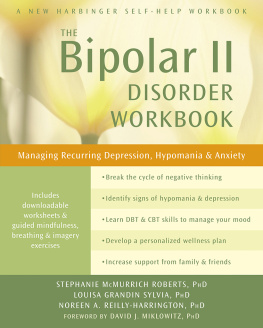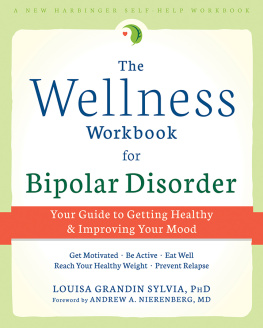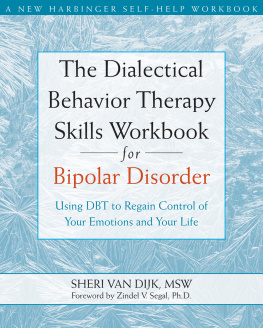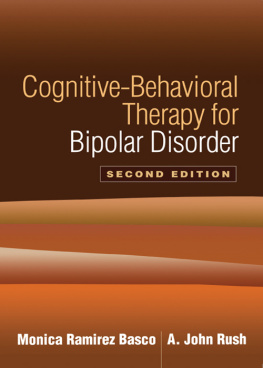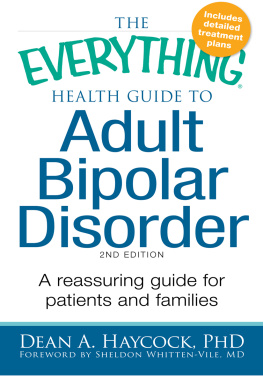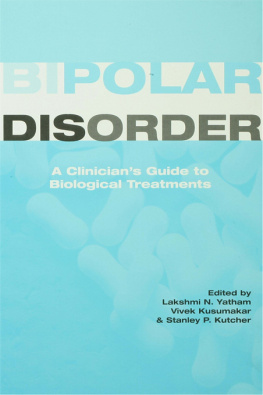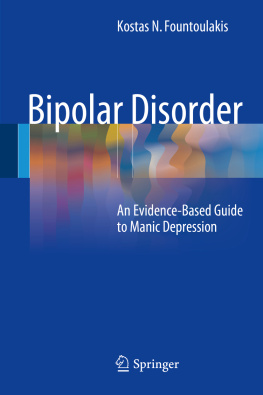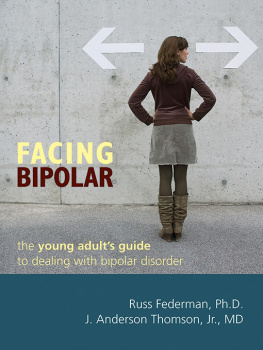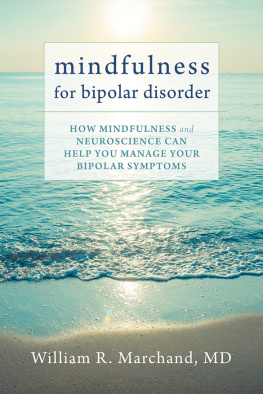Stephanie McMurrich Roberts, PhD, is a clinical psychologist specializing in the cognitive-behavioral treatment of mood and anxiety disorders. Roberts has published a number of peer-reviewed articles related to bipolar disorder and depression. A former instructor in psychology at Harvard Medical School and staff psychologist at the Massachusetts General Hospital Bipolar Clinic and Research Program, she now works in private practice in Boston, MA.
Louisa Grandin Sylvia, PhD, is associate director of psychology at the Massachusetts General Hospital Bipolar Clinic and Research Program and assistant professor at Harvard Medical School. Sylvia is a skilled cognitive-behavioral therapist who develops psychosocial interventions for bipolar disorder. She is currently examining the efficacy of nutrition, exercise, and wellness therapy for bipolar disorder. Sylvia has presented her work at local, national, and international conferences, and has authored many empirically-based articles on the treatment and prevention of bipolar episodes.
Noreen A. Reilly-Harrington, PhD, is an internationally recognized expert on the cognitive-behavioral treatment of bipolar disorder and has coauthored several books and numerous scientific articles on bipolar disorder. For the past seventeen years, she has been on the staff of the Massachusetts General Hospital Bipolar Clinic and Research Program and on the faculty of Harvard Medical School. She has trained thousands of clinicians for academic and industry-sponsored studies in the assessment, diagnosis, and treatment of bipolar disorder, and currently serves as the director of training and assessment for the Bipolar Trials Network.
Foreword writer David J. Miklowitz, PhD, is professor of psychiatry in the division of child and adolescent psychiatry at the University of California, Los Angeless Semel Institute; a senior research fellow in the department of psychiatry at Oxford University; and the author of several articles and books on bipolar disorder and schizophrenia, including The Bipolar Disorder Survival Guide, an international best seller.

[The authors] have provided patients with an essential map and guidebook for people with bipolar II disorder who, by no fault of their own, have become strangers in a strange land. This book includes essential tools that can help people manage their disorder and find their way to wellness and functioning.
Andrew A. Nierenberg, MD, professor of psychiatry at Harvard Medical School, director at the Bipolar Clinic and Research Program at Massachusetts General Hospital, and associate director of the Depression Clinical and Research Program at Massachusetts General Hospital
Bipolar II is a lifelong and often difficult challenge for those who have the disorder and those who care for them. But The Bipolar II Disorder Workbook will help you cope by teaching you how to notice your mood changes, how to turn around your depression or hypomania, and how to help others understand what you are going through. This workbook will give you the tools to work on [managing] your disorder. Written in a clear, easily accessible style, with lots of self-help forms and techniques, this book will be of use whenever things get too high or too low. I highly recommend this very useful guide.
Robert L. Leahy, PhD, director at the American Institute for Cognitive Therapy, associate editor at the International Journal of Cognitive Therapy, and clinical professor of psychology at Weill-Cornell University Medical College, New York Presbyterian Hospital
With refreshingly clear language, three experts in the field draw from the best science in the area to provide a clear road map for how to come to terms with bipolar II disorder. This book offers great advice on how to recognize and gain better control over manic, depressive, and anxious symptoms.
Sheri L. Johnson, PhD, director at Cal Mania (Calm) and lab professor of psychology at the University of California, Berkeley
This workbook is grounded in cutting-edge research for treating mood and anxiety disorders, but distills this broad literature into a user-friendly set of skills specific to managing bipolar disorder, type II. Roberts, Sylvia, and Reilly-Harrington give readers tools that they can apply to their own lives to feel better, such as education about bipolar II and ways to manage negative thinking, temper anxiety, gain social support, and develop a comprehensive wellness plan. This book is a must-read for anyone whose experience of mood disturbance is an obstacle to leading a fuller life.
Lauren B. Alloy, PhD, professor, Joseph Wolpe Distinguished Faculty Fellow, and director of clinical training at Temple University, Philadelphia, PA
I highly recommend this book. The authorsleading researchers in this fieldhave provided a great service to individuals suffering from bipolar II disorder, their families, and mental health care professionals. Useful as a guide and workbook, this book can be used by individuals seeking to learn about the disorder individually, or as a tool in therapy. This concise and very approachable book condenses the latest research on the treatments for bipolar II disorder, helps readers to understand what is unique about this disorder, and reviews the best treatments available. There are excellent chapters on the management of depression, mania, and anxiety that are filled with good advice and practical, problem-solving techniques that will immediately be helpful.
Edward S. Friedman, MD, associate professor of psychiatry at the University of Pittsburgh; director of the Mood Disorders Treatment and Research Program at the University of Pittsburgh; and director of cognitive behavior therapy and adult ambulatory pharmacotherapy training programs at Western Psychiatric Institute and Clinic, Pittsburgh, PA
What a great book! By combining education, tools for self-monitoring, and step-by-step treatments, the authors have created a resource for patients and families with bipolar II disorder that will be used again and again. Roberts, Sylvia, and Reilly-Harrington are skilled therapists, and this workbook is like having access to them any hour of the day.
Michael J. Ostacher, MD, MPH, MMSc, assistant professor of psychiatry in the department of psychiatry and behavioral sciences at Stanford University School of Medicine, CA, and associate director of the bipolar disorder and depression research program at the Veterans Affairs Palo Alto Health Care System in Palo Alto, CA, where he is also director of the Mental Illness Research Education and Clinical Center (MIRECC) fellowship program
This is a great resource for the many patients and professionals who seek better ways to manage bipolar disorder but dont want to reinvent the wheel or waste time searching for tools. We owe the authors our thanks for assembling a treasure trove of excellent tools and the instructions necessary to put them to effective use.
Gary Sachs, MD, associate clinical professor of psychiatry at Harvard Medical School in Boston, MA

Publishers Note
This publication is designed to provide accurate and authoritative information in regard to the subject matter covered. It is sold with the understanding that the publisher is not engaged in rendering psychological, financial, legal, or other professional services. If expert assistance or counseling is needed, the services of a competent professional should be sought.
Next page
